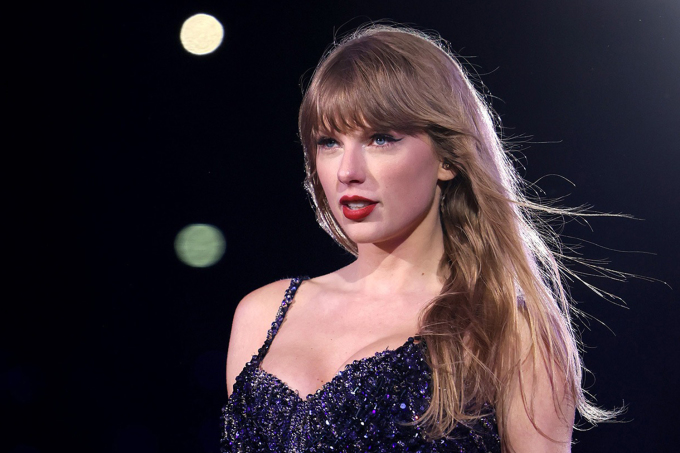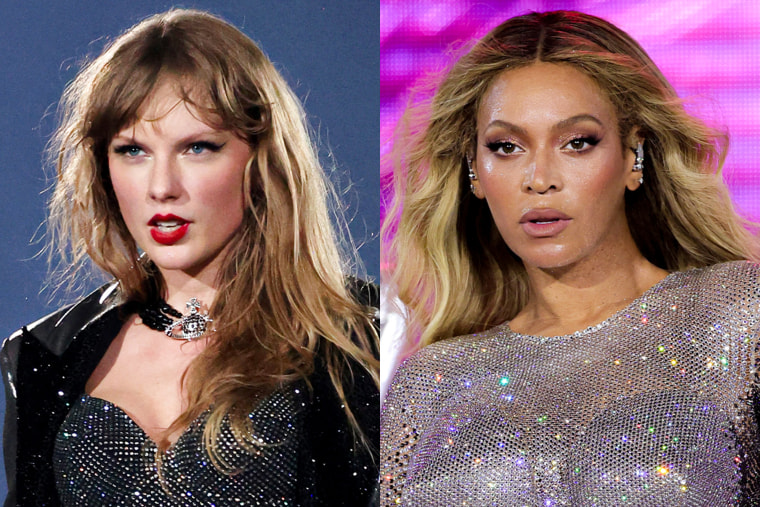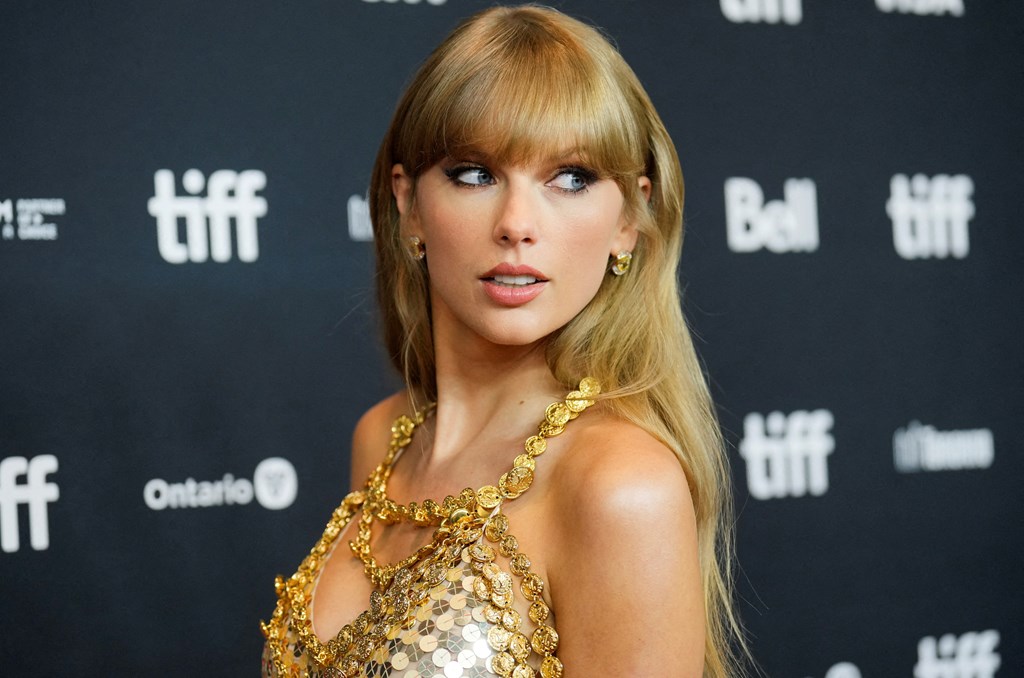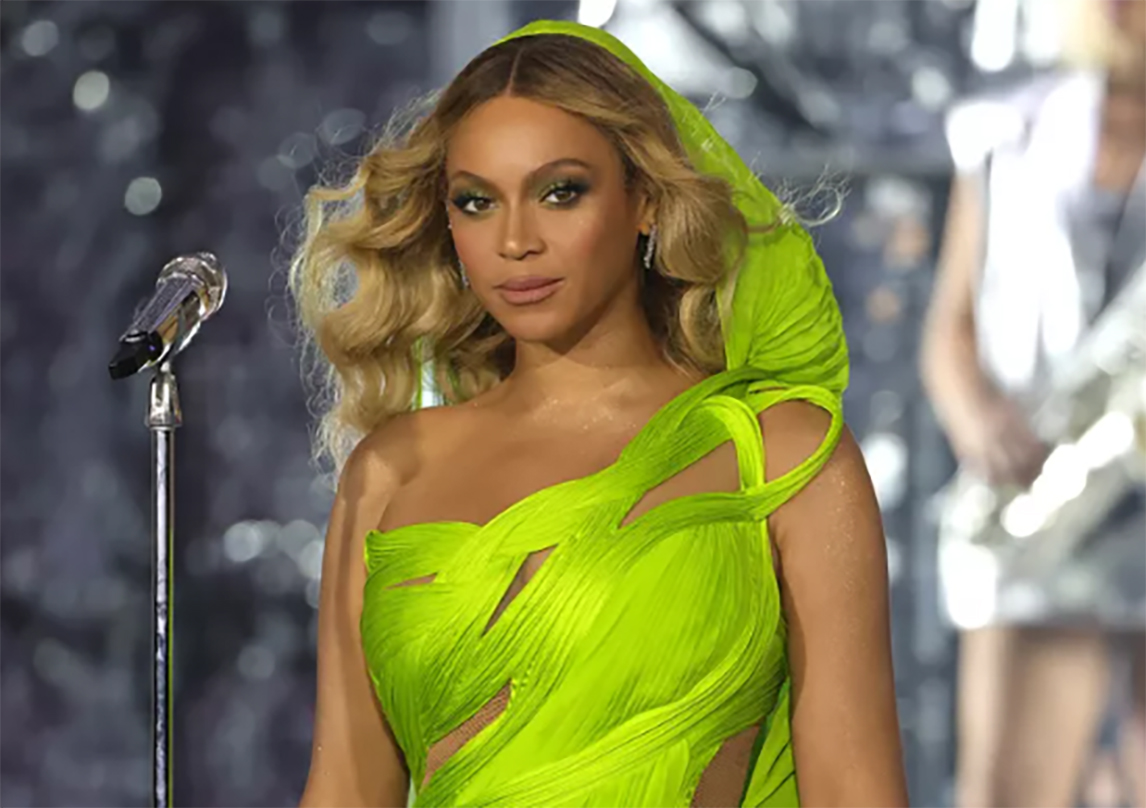Taylor Swift and Beyoncé are bridging divides at the office
The boss is wearing friendship bracelets, colleagues are talking about buying cowboy hats, and morale is getting a boost.
At professional services firm KPMG, managing director Rob Breakiron feels more popular among his entry-level colleagues than he should be as a 45-year-old. He has an unlikely ally in building this office reputation: Taylor Swift.

Breakiron’s affinity for Swift has made him, like many of the “Mastermind” singer’s songs, a hit. He often wears Swift’s merchandise or friendship bracelets from her ongoing Eras tour on team calls. The visual cues aren’t missed by fans of the 14-time Grammy winner’s music, and it helps build connections that can establish him as a trusted mentor.
“It very much directly impacts my ability to connect to the younger generation,” said the northern Virginia resident. “I don’t think it should be underestimated.”
Breakiron is known within his division as the “Swiftie Dad.” After attending multiple tour stops with his daughter, and with more planned over the summer, he’s become a go-to source for teammates seeking concert-related advice.

Coming out of the remote-work era, companies are attempting to reset expectations around norms such as what to wear and how to communicate. In a period rife with headbutting on everything from politics to return-to-office mandates, superstar performers Swift and Beyoncé are providing co-workers across generations and seniority levels with safe terrain to bond over.
The trend first sprouted last year as the pop icons crisscrossed the U.S. on tour. Now, with new albums from both performers topping charts in recent weeks and Swift’s show restarting this month, the two are once again often the topic du jour by water coolers or at the sometimes-awkward start of virtual meetings.
This can be welcome in the post-pandemic world of work, given the continued difficulty of building relationships in hybrid or all-online settings, according to associate professor Angela Hall of Michigan State University’s School of Human Resources and Labor Relations. These ties can help people feel more supported and happy in their roles, she said, which is a plus for both employees and executives at a time of worker apathy.

“Anything that can get people to form a connection, a bond, an affinity, is really important — whether it’s Beyoncé or Taylor, whether it’s the fact that they like to bake, or they have pets,” Hall said. “If people can connect on that level, it can only make things better.”
Hall pointed to a recent survey by the Society for Human Resource Management that showed 45% of workers surveyed feel “emotionally drained” by their jobs and more than half feel “used up” at the end of the workday. Those stats contribute to a sour picture of American labor sentiment following years defined by “quiet quitting” and the “great resignation.”
And employees who report feeling burned out are almost three times more likely to be actively looking for a new job, the research found. But there’s a key caveat: Those who feel a strong sense of belonging in their company are 2½ times less likely to feel burned out in the first place.
A ‘unifying’ interest

Self-proclaimed “Swiftie” Andrew Boyagi agrees with Hall. Other managers might see discussing personal interests during work as a waste of time. But the Atlassian senior director views these moments as essential to forming relationships that can prove beneficial down the road.
“When you’re in the trenches at work, knowing someone personally really helps,” said Boyagi, who oversees a team of more than 20 people located around the world from his home in Australia.
He’s seen updates on Swift’s music and personal life as something employees from across generations jump in to discuss on a team messaging forum. It’s common ground for a group that isn’t always in complete cultural harmony, he said.
For instance, a younger team member informed more senior colleagues that the thumbs-up emoji could be considered passive-aggressive. Boyagi said high-five emojis have emerged as a popular — and subtext-safe — replacement.
“Having been around when ‘thumbs up’ was one of the only emojis available, some of us were very shocked,” he said.
The Swift/Beyoncé buzz has reached the top of major corporations, with business moguls from Amazon’s Jeff Bezos to Bridgewater’s Ray Dalio attending the artists’ concerts. Meta CEO Mark Zuckerberg posted photos of his face bejeweled and wrists covered in friendship bracelets, which have become a hallmark accessory of Swift’s tour.

And it’s earned clout from subordinates for executives such as Susan St. Ledger, president of worldwide field operations at cloud company HashiCorp. St. Ledger, 59, referenced Swift during a sales kick-off speech and walked on stage to the song “Fearless.” Afterward, employees gave her friendship bracelets, one of which had lettered beads spelling out “fearless leader.”
“It’s a reality that a title distances you from people, whether you like it or not,” St. Ledger said. Despite that, she said, Swift’s music has been a “universal language” that’s helped her connect with everyone from the fathers of fans to women who see themselves in the singer.
Some companies capitalized on the cultural phenomena created by the tours. Megh McLaughlin was one of three employees sent to Florida on a reward trip by software company Air that included a night at Beyoncé’s Renaissance tour. After the three women attendees got back, McLaughlin created a recurring virtual meeting for them to catch up with each other, with a title themed to the song “Run the World (Girls).”
Others have brought this excitement to the workplace. Amani Albertsen organized a viewing for the film version of Swift’s Eras tour, which began streaming on Disney+ in March, at the Austin office of financial technology firm Wise.
Albertsen was somewhat nervous opening the event up to the entire building, unsure what non-Swifties would think. While attendees from across departments came together for pre-movie trivia and making friendship bracelets, other colleagues respectfully observed the festivities through the glass doors.
“I thought we were going to get made fun of,” Albertsen said, before adding that the gathering was widely supported and a “unifying” experience.
‘A genuine dose of personality’
Swift and Beyoncé offer noncontroversial talking points as multiple wars wage abroad and the U.S. barrels toward a divisive presidential election, said Michigan State’s Hall. The superstars can also be a distraction for workers contending with economic challenges such as high inflation and the rising cost of homeownership, she added.
Because these performers have had name recognition for over a decade, multiple generations can simultaneously claim interest in them. Meanwhile, non-fans have had time to become at least acquainted with the singers through younger family members or popular culture.
For many employees CNBC interviewed, the artists have given them a way to bring more of themselves to work.
Atlan product marketing lead Sharif Karmally said his ears perked up when a co-founder said Swift was a person she admired. It was during one of the data startup’s “Jeffersonian dinners,” where everyone at the table engages in one meaningful conversation as opposed to several side chats.
That led to an idea for a creative way to announce Atlan’s latest funding round: a music video themed to Swift’s new album, “The Tortured Poets Department.” Karmally wrote the lyrics, and members of the team, from founders to new hires, participated.
:max_bytes(150000):strip_icc()/beyoncehalfuphalfdown-f9052bbec3eb4db98ac6783529bed9ab.png)
When Beyoncé stopped in Atlanta, a colleague tapped Raeah Smith for her knowledge of the “Halo” singer while writing copy tied to the tour for a client of their advertising agency. Smith is part of a co-worker group chat created for discussion of the 32-time Grammy winner and shares her appreciation of Beyoncé as a conversation starter with new hires.
“I was just able to bring a little bit of insider lingo to the post,” Smith said.
Smith said Beyoncé’s fan base, the so-called Beyhive, hasn’t found the equivalent of the Swiftie friendship bracelet, but the co-workers have discussed buying cowboy hats and boots after the Texas-born performer’s recent transition into country music.
Last year, Matt Lindner took time off his media marketing gig to travel to Minneapolis from Chicago for Swift’s concert. Knowing her popularity, Lindner included references — or Easter eggs, as some fans call them — to her songs when crafting an out-of-office email informing people about his plans.
“You’ve drawn my blank space,” the 41-year-old wrote. “If this is urgent, don’t just shake it off,” he later added. “The last thing I want is for there to be any bad blood between us.”
When Lindner returned to his remote job, conversations with co-workers or external clients included discussion about whether others were also seeing the show and their favorite songs. Consider the virtual ice broken.
“It’s kind of my job to put out good vibes in general,” he said of his marketing position. And “a genuine dose of personality — even if it’s something as simple and banal as an out-of-office message — kind of helps reinforce the notion that yeah, there’s a person behind the screen.”